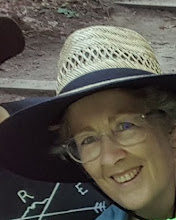
I attend Quaker meeting. The tradition includes sitting in watchful silence until somone is led to speak. This past meeting, it was, among others, me. My favorite Easter story is the last chapter of John--Jesus's final appearance to his disciples. They have fished all night with nothing to show for it. They don't recognize Jesus on the shore but he is waiting for them with a hot breakfast. He encourages them to cast their nets one more time. Which they do, and the story records that their nets were bursting with "great fishes"--enough to have destroyed their nets. But the nets hold and they bring them to shore. With this, they recognize Jesus. As Peter greets him, three times Jesus asks Peter if he loves him. Three times Peter replies to Jesus that he does. And three times Jesus responds, "then feed my sheep"--Jesus's last words on earth to his followers.
Some interpret this as Jesus's command to the church to preach the gospel. Others, of which I am one, believe that he meant exactly what he said--that we are to provide materially for each other as well as spiritually. Jesus spent too much time and energy providing food and healing along with his words for us to think we are not called to do the same.
But for some reason this Sunday morning, the word "encouragement" would not leave me. I lost my older sister a couple of weeks ago. Over these past few years we have been reconnecting after a long absence. And then suddenly she was gone. I've been trying to put into words the space she has left. And it finally came to me, the thing I miss most is her encouragement. We neither one of us got much parental approval growing up. I think she realized, by its absence, what a precious gift it is. So she gave it generously. To me, to my kids, to her children, to her co-workers. In a recent conversation, her husband told me how stunned he was at her memorial to hear people he'd never met talk about what gifts she'd given them, mostly through her encouragement.
For over 25 years, I've taught adults the craft of weaving. But I haven't worked much teaching children and I've never been responsible for disciplining any but my own. So I've been studying Maddie's interactions with them in the library. She can be pretty stern, but even when she is setting limits or correcting them, she offers instruction and encouragement on behaving the right way. And her positive interactions are always about encouraging their interests, asking them to share with her, letting them know by her interest that they matter to her. I am amazed at her attention to this. She has an assistant who works mostly in the back room. Maddie is pretty much the face of the library, and she offers her attention to all 850 children along with all the paperwork, faculty support and technology stuff her job requires. It is likely that her principal will evaluate her based on these last items, but the real power behind her effectiveness as a librarian lies in the little words of interest and enthusiam that she shares with each child. With them she is feeding her sheep.
I don't know how a library program can teach this. Clearly Jesus struggled to convey to Peter the importance of this kind of caring. Now that I am at the end of my library program, with nearly four years of work experience under my belt, I'm certain that I have the professional and technology skills to hold up the technical end of the job. But I'm beginning to understand that everything we've learned in school is not the job--it's only a tool to be used in doing the real job--caring for, encouraging, supporting each other and our community--feeding our sheep.
I've already turned in my portfolio for my degree. It includes, as required, my personal philosophy of library science. But were I to post it now, I think I'd use this quotation I recently came across. It is credited to Bryant S. Hinckley:
"To give encouragement, to impart sympathy, to show interest, to banish fear, to build self-confidence, and awaken hope in the hearts of others, in short--to love them and to show it--is to render the most precious service."
 On April 19, I attended my first Board of Education meeting. Maddie met me there after school. It was a very odd mix of old meets new. With minor changes in dress, it could have been a scene from the 1950's--a moment of silence, a student leading the Pledge of Allegiance, recognition of principals and vice principals, another student singing a popular inspirational song and Amazing Grace, lots of awards certificates punctuated with photos for the local press. The meeting was as much pomp and circumstance as it was business. Only the topics of discussion connected the meeting to the 21st Century.
On April 19, I attended my first Board of Education meeting. Maddie met me there after school. It was a very odd mix of old meets new. With minor changes in dress, it could have been a scene from the 1950's--a moment of silence, a student leading the Pledge of Allegiance, recognition of principals and vice principals, another student singing a popular inspirational song and Amazing Grace, lots of awards certificates punctuated with photos for the local press. The meeting was as much pomp and circumstance as it was business. Only the topics of discussion connected the meeting to the 21st Century.








